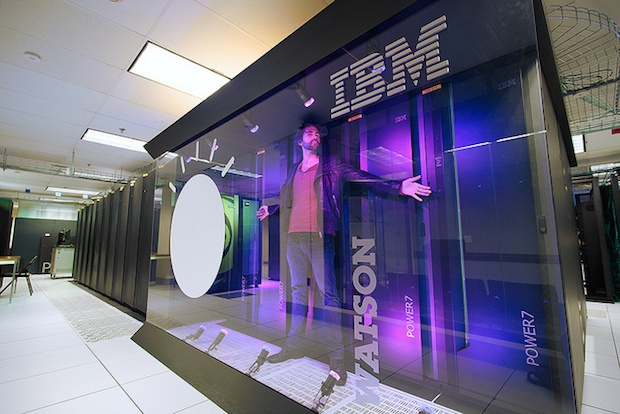 Photo by Sebastian Anthony via Flickr / CC BY-ND 2.0
Photo by Sebastian Anthony via Flickr / CC BY-ND 2.0
I know what you're thinking after reading the title of this article: of course not! Music is fueled by emotions, feelings, and rhythms that move your body and soul. Music is political and opinionated, and there's absolutely no way that a computer could replace a musician. Music wouldn't be music without the emotion behind it, right?
Well, maybe. The term "musician" may not be limited to human beings anymore. Recently, IBM's supercomputer Watson has been making progress conquering human communications. In 2011, Watson successfully defeated its human competitors in games of Jeopardy. Now, it's in the process of learning the language of music.
What exactly is Watson?
Basically, Watson is a supercomputer that analyzes "natural language" questions and is able to answer these questions quickly and precisely. The creation of the machine was inspired by Jeopardy, but Watson and its creators have been dabbling into other forms of communication, like music.
According to CBS News, Watson is now learning how to write original songs related to different moods. Watson writes these songs by "listening" to different pieces of music, deconstructing the pieces, analyzing human behavior patterns in the music, and is then "inspired" to write its own music. The computer is being taught how to convey emotions by recognizing human patterns and observing the usage of major and minor chords, which often represent "happy music" and "sad music."
Could this actually benefit musicians?
While computer-generated music has existed for decades now, Watson's music is the first to be completely created by a computer. There's hope that one day "Watson Beat" will be accessible for everyone via an app.
Much like other innovations in music technology, it's implied that Watson's new abilities provide collaboration tools for human musicians. And while Watson may be able to create music associated with emotions, it still learns from music made by humans. Watson's "creative" capabilities are intended to act as another means for music making, like an instrument or otherwise.
As for the future of Watson and its relationship with music, there are some who argue that Watson cannot take the place of human creativity and connection. After all, music isn't just based on emotion; music is made up of experiences, opinions, and individual personalities.
But we still have to wonder: is this new technological advancement going to change the way we listen to, make, and enjoy music? Will Watson be able to create a new genre of artificial intelligence music unique to computer songwriters? Will Watson be able to go beyond writing tunes and begin to enter the realm of entertainment and performing? Is Watson ultimately going to be a tool that helps humans, or will it only work against its human counterparts?
Thus far, people have used new innovations in music to expand upon what is creatively possible, from the introduction of multitrack recording to sample manipulation. But with the advent of artificial intelligence, it seems like there is a possibility humans will not stand alone in the realm of creativity.
Do you think supercomputers like Watson will ever take the place of human musicians? Let us know in the comments!
Rachel Bresnahan is an editorial intern at Sonicbids.






